Dec 11, 2014
“As long as nature is seen as property in law, there can be no justice for communities, the climate or nature”
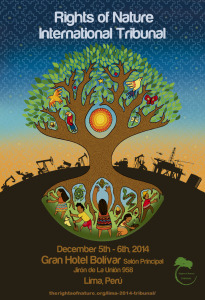 The International Tribunal for the Rights of Nature took place on 5 and 6 December 2014 in Lima. On trial were corporations, the United Nations, and government. Cases included mining in Peru and Ecuador, oil extraction in Ecuador, the Belo Monte dam in Brazil, fracking in Bolivia and the USA, BP’s Gulf of Mexico oil spill, damage to the Australian Barrier Reef. And REDD.
The International Tribunal for the Rights of Nature took place on 5 and 6 December 2014 in Lima. On trial were corporations, the United Nations, and government. Cases included mining in Peru and Ecuador, oil extraction in Ecuador, the Belo Monte dam in Brazil, fracking in Bolivia and the USA, BP’s Gulf of Mexico oil spill, damage to the Australian Barrier Reef. And REDD.
The judges referred to the Rights of Nature and the Universal Declaration of the Rights of Mother Earth, from the World People’s Conference on Climate Change and the Rights of Mother Earth in Cochabamba, Bolivia in 2010.
The president of the tribunal was Alberto Acosta, former president of the Constitutional Assembly of Ecuador. Acosta said,
“As long as nature is seen as property in law, there can be no justice for communities, the climate or nature.”
The case against REDD at the Tribunal is explained here:
REDD (Reducing emissions from deforestation and forest degradation) is a global initiative to create a financial value for the carbon stored in native forests and tree plantations, soils and agriculture, including plankton and algae in the oceans. This involves the opening of the carbon cycling capacity of the Earth to economic valuation and trading in financial market systems. Indigenous peoples, forest dwellers, small farmers and peasants view REDD as a false solution for mitigating climate change that have resulted in land grabs, evictions and human rights abuses. REDD is inherently about commodifying and privatizing air, trees and land by selling nature and air to generate permits to pollute. These permits to pollute also known as carbon or emission credits are used by polluters to avoid reducing greenhouse gas emissions at source. This Tribunal on REDD and forests will listen to testimonies on the concern of REDD and other carbon and emissions trading and offset regimes violating the rights established in the Universal Declaration of the Rights of Mother Earth.
Mary Lou Malig of the Global Forest Coalition spoke against carbon markets:
“[They’re] basically a mechanism to cheat. It’s about enabling you to pollute. Instead of cutting your emissions, you increase them and pretend to reduce by offsetting.”
Ninawa Kaxinawá, president of the Huni Kui people in Acre, Brazil spoke out against REDD. “Nature has no price. It’s our forest, it’s our food, it’s our spirit.”
In an interview with Democracy Now, Ninawa explains that REDD prevents communities from fishing on their own land and from practising agriculture. He says that, “leaders are being criminalized for opposing the project, and communities are told that the services provided for education or transportation or healthcare will be suspended if they oppose the project.” Ninawa has received death threats for opposing REDD.
Amy Goodman of Democracy Now asked Ninawa how REDD affects his community. Here’s his reply:
The first impact is that the state of Acre is one of the first states in the world that is promoting REDD, and it is the first state of the Brazilian Amazon that is doing REDD. And it has already violated Convention 169 of the International Labor Organization, which guarantees indigenous people’s right to free, prior, informed consent and the right to say no to projects that affect us. So, Brazil is violating Convention 169, because indigenous peoples have not been consulted about REDD and it is moving forward.
The second impact of REDD is that it has divided indigenous leaders, who before were united to defend the territories and Mother Earth.
A third impact of REDD is that it has resulted in the co-optation of some leaders who have accepted money and bought cars with that money, and they don’t even know where that money is from and what it means.
Another impact is that the government of Brazil, because it is opening its doors to this carbon-offset mechanism, is that it’s gutting the laws and the legal framework on indigenous people’s rights and the guarantees that have been enshrined to protect our rights to our territories.
You can watch the full interview here:
Cassandra Smithie, a translator and interpreter, and Ivonne Yanez of Oilwatch presented evidence against REDD. Here’s how the Guardian reported Smithie’s contribution:
Casandra Smithie went even further, citing a whole series of peoples who have struggled against, or have been threatened by, Redd and calling it a “crime against Mother Earth, Father Sky, and humanity.” The key perpetrators, she noted, such as the UN, the World Bank, extractive industries, multilateral banks, chemical companies, governments and stock exchanges, all have their headquarters in the industrialised northern countries.
“[Redd gives] permits to pollute,” Smithie told the Tribunal. “[It means] forests of the world acting as a sponge for northern industrial countries’ pollution. They can pollute if they grab forests in the global south.”
Dec 10, 2014
Lima, Peru (Dec. 7, 2014)– The International Tribunal for the Rights of Nature judged twelve international and domestic cases; examining the violation of the rights of peoples and nature committed by corporations, The United Nations, and governmental entities. The judgments reference the legal framework of the Rights of Nature and the Universal Declaration of the Rights of Mother Earth. The cases were reviewed on Dec. 5th and 6th in Lima’s Gran Hotel Bolivar.
According to Alberto Acosta, president of the Tribunal and former president of the Constitutional Assembly of Ecuador, the rights of nature must have a universal validity. “This ethical tribunal arises when States fail to fulfill their obligation to preserve the lives of living beings,” said Acosta. “As long as nature is seen as property in law, there can be no justice for communities, the climate or nature.”
The Tribunal was dedicated to Shuar leader, José Tendentza, who was found murdered just days before the Tribunal. Tendentza of Southern Ecuador was scheduled to present the Condor Mine case. Acosta led the 13 judges through 12 cases that were determined by the judges to demonstrate egregious violations to rights of nature and human rights. Cases included:
False Solutions related to Climate Change and REDD+;
Peruvian cases: Conga Mine, Bagua Massacre – Defenders of Earth, 4 River Basins of Peru;
Ecuadorian cases: Condor Mine, Chevron/Texaco, and Yasuni ITT
Brazil: Belo Monte Dam
USA and Bolivia: Hydraulic fracturing “fracking”
Oceans: BP Gulf of Mexico Oil Spill, coal mine and other threats to Australia’s Great Barrier Reef
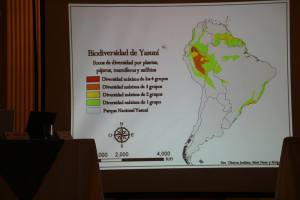 Of the cases, the oil exploitation of the Yasuni territory of Ecuador was condemned in addition to the relentless persecution Yasunidos are facing for their dissent. Since 2013, the Ecuadorian government green-lighted oil drilling in Yasuni National Park, one of the most biodiverse areas in the world and home to two indigenous nations in voluntary isolation.
Of the cases, the oil exploitation of the Yasuni territory of Ecuador was condemned in addition to the relentless persecution Yasunidos are facing for their dissent. Since 2013, the Ecuadorian government green-lighted oil drilling in Yasuni National Park, one of the most biodiverse areas in the world and home to two indigenous nations in voluntary isolation.
In protest, a group of young Yasunidos joined together to claim the rights of nature, which are guaranteed in the Constitution of Ecuador. They collected more than 800,000 signatures to call for a referendum on the oil exploitation, but their request was rejected by electoral institutions. The Yasunidos are now suing the Ecuadorian government, led by President Rafael Correa, and are waiting for their complaint to be reviewed by the tribunal of the Inter-American Commission on Human Rights (CIDH).
Additionally, the Tribunal for the Rights of Nature found Chevron-Texaco in Ecuador to be guilty of using inappropriate technology and causing irreversible damage to the environment. They determined that the corporation must fully compensate those affected by the environmental impact.
The Peruvian cases of Conga and Bagua were accepted as threats of violation to the rights of nature. An international special commission was appointed to visit the impacted Amazonian basins to collect more information on the contamination.
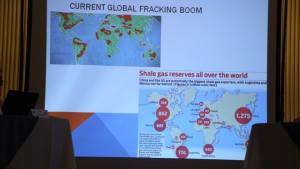 The case of the mining project in the Cordillera del Condor was found by the Tribunal to be in direct violation of the rights of nature. They determined that mining must be suspended and those affected must be compensated. They urge the state to investigate and punish those responsible for the death of José Tendentza, the prominent social activist that was in opposition to the mining.
The case of the mining project in the Cordillera del Condor was found by the Tribunal to be in direct violation of the rights of nature. They determined that mining must be suspended and those affected must be compensated. They urge the state to investigate and punish those responsible for the death of José Tendentza, the prominent social activist that was in opposition to the mining.
Shannon Biggs, director of Movement Rights, shared testimony on the impacts of fracking [Hydraulic Fracturing], a process of extracting natural gas from shale rock layers deep within the earth. “You cannot do safe fracking,” said Biggs. “This technique should have never been invented. It is one of the most destructive activities against the environment ever seen.”
According to Biggs, 800,000 active oil and gas wells are being fracked in the United States, producing roughly 300,000 natural gas barrels per day. Severe water pollution and earthquakes have been linked with fracking. “We die from fracking. The population is suffering from cancer; my sister has died,” said Casey Camp-Horinek (Ponca) of Oklahoma in her testimony. “The water is contaminated; we cannot fish. We are in danger of extinction.”
Plans to develop large-scale hydraulic fracking in Bolivia were reported by Martin Vilela of Platform Climate Reaction. In recent years the country has increased the production and export of natural gas. 82.4% of its production is exported, generating more than six billion dollars a year. Bolivia has 8.23 trillion cubic feet of gas, and YPFB plans to invest over 40 million dollars between 2013 and 2015. Vilela explained that in 2013 this corporation signed an agreement for fracking in the Chaco area, a region with water scarcity to extract 48 trillion cubic feet of shale gas. Estimates determine that this would consume between 112 and 335 billion liters of water.
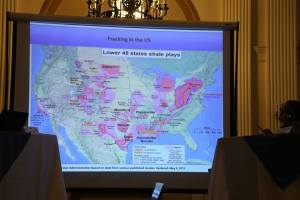 Nnimmo Bassey, a Nigerian architect, environmental activist presented on the contamination and temperature rise affecting Nigeria. According to Bassey, oil fields and pipelines have caused deep environmental degradation, deforestation, and countless oil spills. Life expectancy in these impacted areas is 44 years.
Nnimmo Bassey, a Nigerian architect, environmental activist presented on the contamination and temperature rise affecting Nigeria. According to Bassey, oil fields and pipelines have caused deep environmental degradation, deforestation, and countless oil spills. Life expectancy in these impacted areas is 44 years.
Bassey warned that climate change will have catastrophic consequences. “For every degree the temperature rises globally, in Africa it will rise an additional 50%.” In 2012 floods in Nigeria led to the relocation of 6 million inhabitants. Bassey speculates that in 2030 Africa violent conflicts will increase by 54% due to the lack of access to natural resources.
At the hearing on “false climate solutions,” geoengineering techniques that seek to manipulate climate without changing the conditions that cause climate change were reviewed.
REDD+ was also put on trial. President of the Huni Kui people of Acre, Brazil, Ninawa Kaxinawá (Hunikui) testified that “REDD is a lie. We do not accept putting nature on market because it is our soul and spirit; it is priceless, it is our voice.”
According to Ruth Nyambura, of the Biodiversity Network Africa, says that in Kenya, evictions are occurring as a result of REDD. “Four indigenous people were arrested,” said Nyambura. “A woman was hit by the forest service because she was outside of her land.”
The Tribunal is calling for a special hearing in Paris in 2015 to coincide with the upcoming UN COP 21 summit.
Dec 10, 2014
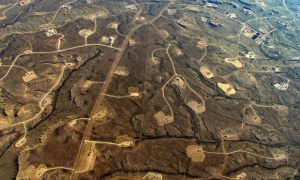
Photo: Fracking wellpads in Wyoming in the USA: “a total and utter form of destruction”, the International Tribunal on the Rights of Nature was told. Photograph: Free source
Thirteen judges meet in Peru to hear accusations that the rights of ‘Mother Earth’ are being violated
It’s difficult to know what was more moving or arresting. There was the Ponca lady, Casey Camp-Horinek, starting to cry as she spoke about the impacts of hydraulic fracturing, or “fracking”, on her people in what she called “occupied” Oklahoma in the US, and saying “We’re having a funeral a week… We’re this close to being fracked to death.”
Then there was Kandi Mossett, from North Dakota, a fracking “victim who wasn’t able to come”. She appeared on the projector and broke down too, telling how “these radioactive frack socks [that are] off the charts on the Geiger counters” are being dumped and found by children who say things like, “Hey, we’re catching bugs with our nets.”
That was right after Shannon Biggs, the executive director of Movement Rights, had explained that fracking in the US is destroying lives, livelihoods, groundwater, rivers, farms, prairies, communities and landscapes, as well as causing “earthquakes where earthquakes don’t exist” and poisoning “millions and millions and millions” of gallons of water that are “taken out of the hydrological cycle forever”.
“[Fracking] is a total and utter form of destruction,” said Biggs, who calls Mossett’s indigenous territory “the most intensive fracking site” in the US. “You take land that is beautiful and full of life and vibrant with a dynamic sense of biodiversity, and we turn this landscape with fracking technology into waste land that is poisoned land [with] sick animals and sick human beings.”
Camp-Horinek and Biggs were speaking before the International Tribunal for the Rights of Nature which met in Lima, Peru, on Friday and Saturday. The objective was to investigate cases of possible violations of the Rights of Nature as laid out in the Universal Declaration of Rights of Mother Earth made in Bolivia in 2010.
In total 12 cases were heard, by 13 judges, with an Ecuadorian lawyer, Ramiro Avila, acting as “prosecutor for the earth” and numerous experts and impacted people from around the world called as witnesses. One such case was made against fracking for its impacts on “the subsoil of Mother Earth”, and another against “climate change caused by human activities” – just as the United Nations’ climate talks are being held elsewhere in Lima.
According to Pablo Solón, a Bolivian from Focus on the Global South, the rising and acidifying oceans, biodiversity loss, desertification, forest fires and increasing number of extreme weather events caused by global warming constitute a “systematic violation of Mother Earth’s” rights.
Solón was joined by Nnimmo Bassey, from Nigeria, who said that “business as usual means cooking Africa” and cited statistics of six million people displaced by floods in Africa in 2012 and a projected 54% increase in African civil wars by 2030 as a result of climate change. Bassey showed photos of a fisherman returning from work, both feet black with oil, and who now sells firewood.
“He came back with nothing [that day],” Bassey told the Tribunal. “Livelihoods have been absolutely destroyed … [Oil brings] disregard for people, for culture, for life, for everything.”
The climate change case also included severe criticism of – and total opposition to – certain measures being considered and/or proposed by the UN, governments and companies as “solutions” to global warming. These included various geo-engineering technologies – described by Silvia Ribeiro from the ETC Group as a “very useful way” of avoiding addressing the fundamental causes of climate change – as well as “climate-smart agriculture” and carbon markets.
“[They’re] basically a mechanism to cheat,” said Mary Lou Malig, from the Global Forest Coalition, about carbon markets. “It’s about enabling you to pollute. Instead of cutting your emissions, you increase them and pretend to reduce by offsetting.”
Another case was made against “Reducing Emissions from Deforestation and Forest Degradation” (Redd) – a concept which involves paying those who ostensibly reduce emissions by supposedly keeping forests standing, depending on how much carbon is stored in them. Criticism was as much about the principles and philosophy behind Redd as how it works in practice.
Ninawa, an indigenous Kaxinawá man from Brazil, expressed concern about a Redd project in his home state, Acre, saying, “Nature has no price. It’s our forest, it’s our food, it’s our spirit.”
Ruth Nyambura, from the African Biodiversity Network, said that indigenous Sengwer people in Kenya are being evicted from their land and having their houses burnt by the Kenya Forest Service because of a Redd project funded by the World Bank, and called it a “new form of conservation” and “colonization.”
“This is not “management”, it is “government,”” she said. “We must reject the financialization of nature. We must reject Redd definitely.”
Casandra Smithie went even further, citing a whole series of peoples who have struggled against, or have been threatened by, Redd and calling it a “crime against Mother Earth, Father Sky, and humanity.” The key perpetrators, she noted, such as the UN, the World Bank, extractive industries, multilateral banks, chemical companies, governments and stock exchanges, all have their headquarters in the industrialised northern countries.
“[Redd gives] permits to pollute,” Smithie told the Tribunal. “[It means] forests of the world acting as a sponge for northern industrial countries’ pollution. They can pollute if they grab forests in the global south.”
Other cases were made against “human activities” affecting the Great Barrier Reef in Australia, the BP Deepwater Horizon blowout’s impacts on the “sea and living beings” in the Gulf of Mexico, the Belo Monte dam in Brazil for its impacts on the Xingu and Amazon rivers, Chevron-Texaco for oil operations in the Ecuadorian Amazon, oil exploitation affecting four river basins in the Peruvian Amazon, oil operations in the far east of the Yasuní National Park in Ecuador, the Mirador mine in Ecuador, the Conga mine in Peru, and mining and oil operations in the Bagua region in Peru.
The UN climate talks, taking place elsewhere across Lima, came in for severe criticism at the Tribunal. Among other things, it was noted, by Malig, that agriculture isn’t up for negotiation, and that the UN is placing great hope in Redd – the “crime against humanity” which, according to Smithie, will be the “basis of the Paris accord”, i.e. the agreement for post-2020, when the Kyoto Protocol expires, that could be reached at next year’s UN climate talks in the French capital.
The Tribunal responded to the hearings by emitting one damning sentence including the verdict that BP and both the Australian and Ecuadorian governments have violated the Rights of Nature, and by issuing a series of orders. These include that BP should abstain from any future deepwater exploration, that Australia should restrict tourism involving the Great Barrier Reef, that Ecuador should suspend Mirador and restore the impacted area, and that Chevron should comply with Ecuadorian court orders to restore damaged areas in the Amazon and pay financial compensation – a ruling that Chevron argued had been reached by fraud and racketeering and which it challenged by filing suit against the Ecuadorian plaintiffs and their lawyers.
The Tribunal’s sentence also acknowledged statements made by Camp-Horinek and Patricia Gualinga, a Kichwa woman from Ecuador, about how the earth is a “living being” on which “all other living beings depend” and that it has a right to life, to respect, and to be consulted.
Nov 10, 2014
Free & open to the public
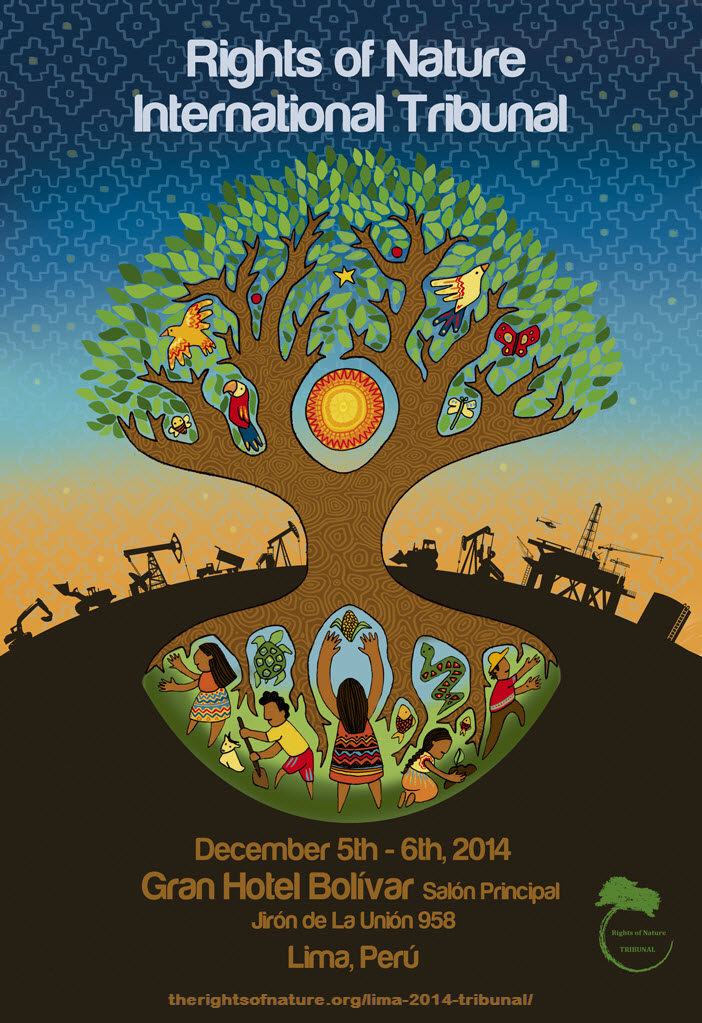 Parallel to the UN FCCC December 2014 meetings in Lima, the Global Alliance convened its second International Rights of Nature Tribunal. The intention was to hear a small number of cases aligned with the UN FCCC COP 20 priorities. Selected cases addressed the impacts of Climate Change, threats to the Great Barrier Reef, destructive oil and mineral extraction in Peru and South America, and protection of Defenders of the Earth such as the Bagua massacre that is on trial this year in Peru. The Tribunal was dedicated to honor Shuar leader José Isidro Tendetza Antun from Ecuador.
Parallel to the UN FCCC December 2014 meetings in Lima, the Global Alliance convened its second International Rights of Nature Tribunal. The intention was to hear a small number of cases aligned with the UN FCCC COP 20 priorities. Selected cases addressed the impacts of Climate Change, threats to the Great Barrier Reef, destructive oil and mineral extraction in Peru and South America, and protection of Defenders of the Earth such as the Bagua massacre that is on trial this year in Peru. The Tribunal was dedicated to honor Shuar leader José Isidro Tendetza Antun from Ecuador.
Gran Hotel BolivarA distinguished panel of judges heard the cases in Lima presented by the Prosecutor for the Earth and expert witnesses. The two day Tribunal was held Friday 5 – Saturday 6 December at the Gran Hotel Bolivar. Gran Hotel Bolivar is in the historical center of Lima on Plaza San Martín and a short walk (1.1 km) to the Alternative Peoples Conference near Parque de la Exposición in central Lima.
Register at International Rights of Nature Tribunal – Lima.
International Rights of Nature Tribunal Background
In January 2014, the Alliance launched the International Rights of Nature Tribunal in Quito, Ecuador in conjunction with the 2014 Global Rights of Nature Summit. The Tribunal is to be a permanent international people’s tribunal for Rights of Nature.
For the initial launch in January 2014, nine diverse cases were presented to a distinguished international, multicultural panel of judges. The Universal Declaration of the Rights of Mother Earth, and in selected cases the Ecuadorian Constitution, provided the legal basis for review and judgment. Among the cases were the Chevron-Texaco pollution case (Ecuador); BP Deep Horizon oil spill (USA); Yasuní-ITT oil project (Ecuador); the endangerment of the Great Barrier Reef by coal mines (Australia); hydraulic fracturing (USA) and the impacts of Climate Change (global). Videos and presentations from the Rights of Nature Tribunal are posted at www.therightsofnature.org/rights-of-nature-tribunal/. Since the launch, a Chamber convening of the Yasuni-ITT case has presented a verdict in August 2014. See Yasuni Verdict.
Among the distinguished panel of judges are:
- Alberto Acosta, economist and former President of the Constituent Assembly from Quito, Ecuador
- Raúl Prada Alcoreza, Philosopher, sociologist, author, former member of the Bolivian Constituent Assembly of 2006-2007, Bolivia
- Hugo Blanco, Political leader, leader of the Confederación Campesina del Perú, Peru
- Tantoo Cardinal, actress (e.g., Dances with Wolves) from the Tar Sands of Canada
- Blanca Chancoso, Kichwa leader and educator from Cotacachi, Imbabura, Ecuador
- Tom Goldtooth, Dine’/Dakota, director of Indigenous Environmental Network from Minnesota, USA
- Francios Houtart, professor, philosopher, theologian, Belgium
- Osprey Orielle Lake, Co-Founder and Executive Director, Women’s Earth and Climate Network, USA
- Edgardo Lander, sociologist, professor, Venezuela
- Rocío Silva Santiesteban, National Human Rights Coordinator, author, professor, Perú
- Atossa Soltani, founder and Executive Director of Amazon Watch, USA
- Terisa Turner, professor Sociology and Anthropology, former UN Energy Specialist, Canada
 The International Tribunal for the Rights of Nature took place on 5 and 6 December 2014 in Lima. On trial were corporations, the United Nations, and government. Cases included mining in Peru and Ecuador, oil extraction in Ecuador, the Belo Monte dam in Brazil, fracking in Bolivia and the USA, BP’s Gulf of Mexico oil spill, damage to the Australian Barrier Reef. And REDD.
The International Tribunal for the Rights of Nature took place on 5 and 6 December 2014 in Lima. On trial were corporations, the United Nations, and government. Cases included mining in Peru and Ecuador, oil extraction in Ecuador, the Belo Monte dam in Brazil, fracking in Bolivia and the USA, BP’s Gulf of Mexico oil spill, damage to the Australian Barrier Reef. And REDD.




